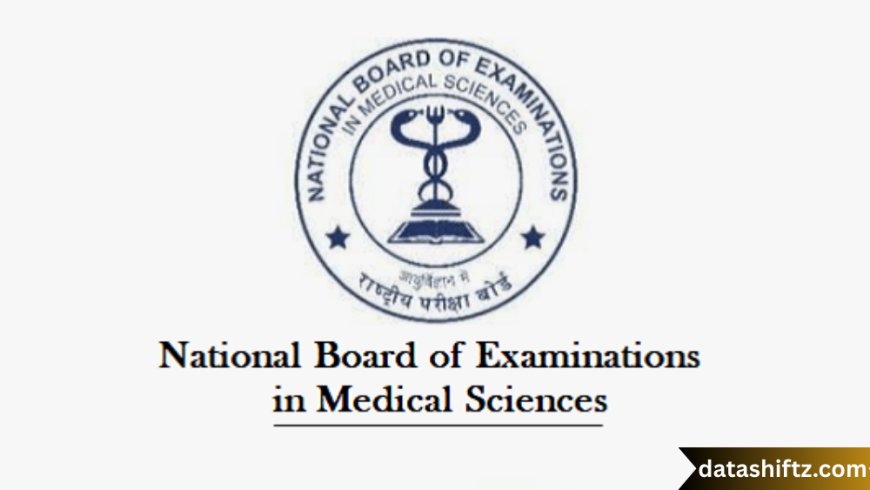NBEMS: National Board of Examinations in Medical Sciences - A Comprehensive Overview

Introduction
The National Board of Examinations in Medical Sciences (NBEMS) is a premier medical education body in India responsible for conducting postgraduate medical exams and certifications. Established to standardize the quality of medical education and assessment across the country, NBEMS plays a critical role in shaping India's healthcare system by ensuring that medical professionals meet high standards of competence. This article explores NBEMS's purpose, functioning, exam patterns, eligibility criteria, and recent developments. Whether you are a medical student preparing for your postgraduate exams or an educator interested in medical assessment frameworks, this post provides essential insights into NBEMS.
What is NBEMS?
Overview and Objectives
The National Board of Examinations in Medical Sciences (NBEMS) was established in 1975 by the Ministry of Health and Family Welfare, Government of India, with the aim to:
-
Conduct high-quality postgraduate medical examinations.
-
Award Diplomate of National Board (DNB) qualifications.
-
Provide standardized, objective, and reliable assessments.
-
Ensure uniformity in medical training across India.
NBEMS works to elevate the standards of specialist medical education and bridge gaps between undergraduate education and specialist practice.
Structure and Governance
NBEMS functions under the National Board of Examinations (NBE), an autonomous body under the Ministry of Health. It comprises expert committees that oversee curriculum design, exam formulation, result evaluation, and certification issuance. Its governance ensures transparency, credibility, and adherence to international best practices in medical evaluation.
NBEMS Examinations: Types and Process
Major Exams Conducted by NBEMS
NBEMS primarily conducts the following examinations:
| Exam Name | Purpose | Frequency | Qualification Awarded |
|---|---|---|---|
| DNB Final Exit Examination | Postgraduate specialist qualification | Twice a year | Diplomate of National Board (DNB) |
| NEET-PG (NBE) | Entrance for PG medical courses | Annually | Eligibility for PG courses |
| FMGE (Foreign Medical Graduates Examination) | Screening for foreign medical graduates | Twice a year | License to practice in India |
| NExT (National Exit Test) | Proposed licensure exam for MBBS graduates | To be implemented | License to practice and PG entry |
This table summarizes the essential exams managed by NBEMS to regulate entry and exit in various stages of medical training and licensing.
Examination Process and Format
The DNB final exams typically comprise:
-
Theory Papers: Multiple-choice questions (MCQs) and short answer questions covering specialty-specific syllabus.
-
Practical/Clinical Exams: Hands-on patient examination, case presentations, and viva voce.
-
Internship/Training Assessment: Continuous assessment of clinical skills during training.
The FMGE, for foreign medical graduates, is an MCQ-based screening test ensuring candidates meet Indian medical standards before licensing.
Eligibility and Application for NBEMS Exams
Who Can Apply?
Eligibility varies by exam:
-
DNB Final Exit: Candidates must have completed the prescribed duration of training in accredited centers.
-
NEET-PG: Medical graduates seeking admission into postgraduate courses.
-
FMGE: Indian citizens or Overseas Citizens of India (OCI) who have obtained a medical degree from a foreign university.
-
NExT: Will apply to all MBBS graduates post-implementation.
Application Procedure
Candidates must register online through the official NBEMS portal:
-
Create an account on the NBEMS website.
-
Fill in the application form with personal, academic, and training details.
-
Upload relevant documents like MBBS/DNB certificates, internship completion proof, ID proof, and photographs.
-
Pay the prescribed exam fee online.
-
Download admit cards upon confirmation.
Regular notifications and updates are issued on the NBEMS portal, ensuring transparency and timely communication.
Impact of NBEMS on Indian Medical Education
Standardizing Medical Training
NBEMS has significantly contributed to:
-
Uniform standards in postgraduate medical education.
-
Recognition of DNB qualifications as equivalent to MD/MS degrees by the Medical Council of India (now National Medical Commission).
-
Providing opportunities to candidates trained in private institutions.
-
Enhancing the quality of specialist doctors serving across India.
Challenges and Future Prospects
Despite its successes, NBEMS faces challenges such as:
-
Aligning curricula across diverse training centers.
-
Managing the transition to NExT, which integrates licensure and postgraduate entrance.
-
Expanding exam infrastructure to meet rising candidate numbers.
-
Incorporating digital assessment tools for enhanced reliability.
The upcoming NExT exam promises to revolutionize licensing and PG admission processes by creating a unified evaluation system.
Summary Table: NBEMS Exams at a Glance
| Exam Name | Purpose | Eligibility | Exam Format | Frequency |
|---|---|---|---|---|
| DNB Final Exit Examination | Specialist postgraduate qualification | Completion of training at accredited center | Theory + Practical + Viva | Twice a year |
| NEET-PG | PG Medical admission | MBBS graduates | Computer-based MCQ | Annually |
| FMGE | Screening foreign medical graduates | Foreign medical degree holders | Computer-based MCQ | Twice a year |
| NExT | Proposed national licensure and PG entrance | MBBS graduates (India & abroad) | Computer-based MCQ + Practical | From 2025 onwards |
Important Points to Remember About NBEMS
-
DNB is equivalent to MD/MS: National Medical Commission recognizes DNB qualifications offered through NBEMS as equal to traditional MD/MS degrees.
-
FMGE is mandatory for foreign graduates: Indian nationals with foreign medical degrees must clear this screening to practice in India.
-
Online Application Process: NBEMS uses a transparent and digital portal for all exam applications and communications.
-
NExT Exam Introduction: From 2025, NExT will unify medical licensure and PG admission, simplifying the examination landscape.
-
Continuous Monitoring: NBEMS constantly updates exam patterns and training standards in line with global medical education trends.
-
Wide Range of Specialties: DNB courses are available across multiple medical and surgical specialties.
-
Focus on Clinical Competence: NBEMS exams emphasize practical clinical skills alongside theoretical knowledge.
Conclusion
The National Board of Examinations in Medical Sciences (NBEMS) serves as a cornerstone in India's medical education ecosystem. By regulating postgraduate medical qualifications, licensing foreign medical graduates, and moving towards a unified licensure test, NBEMS ensures the medical fraternity upholds high standards of clinical expertise and knowledge.
Its robust examination framework, recognition by the National Medical Commission, and continuous innovations make NBEMS a vital institution for medical aspirants and healthcare development in India. As the healthcare landscape evolves, NBEMS will continue to adapt, ensuring that Indian doctors remain globally competitive and clinically proficient.





























